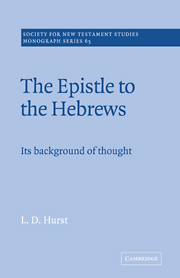4 - The Stephen tradition
Published online by Cambridge University Press: 20 November 2009
Summary
History of discussion
The speech of Acts 7 is one of the peculiarities of the New Testament. Many think that it stands unique among the speeches of Acts, and attempts to explain its purpose, background and idiosyncrasies have occupied more studies than any other Lucan discourse. The interest which this “manifesto” of early Christianity has engendered among modern biblical interpreters has led inevitably to a comparison of Acts 7 and Hebrews. Yet, since no consensus regarding the background and significance of the speech seems likely, it is not surprising that there is little agreement regarding a possible relationship to Hebrews.
The best-known argument for Acts 7 and Hebrews remains William Manson's Baird Lecture for 1949. According to Manson, it was Stephen who first “grasped and asserted the more-than-Jewish-Messianic sense in which the office and significance of Jesus in Religious history were to be understood.” The “universalist” stance of Stephen and the “Hellenists,” moreover, is to be distinguished from that of the “Hebrew” (Galilean) Christians of Jerusalem, who, still bound to the static temple and law, were waiting for the Kingdom to be restored to Israel. Stephen's speech, a historically reliable report of the “Hellenist” teaching, thus reflects a primitive breach within Christianity; Stephen's dying vision discloses him as an eschatologist who “saw that the Messiah was on the throne of the universe.”
- Type
- Chapter
- Information
- The Epistle to the HebrewsIts Background of Thought, pp. 89 - 106Publisher: Cambridge University PressPrint publication year: 1990



